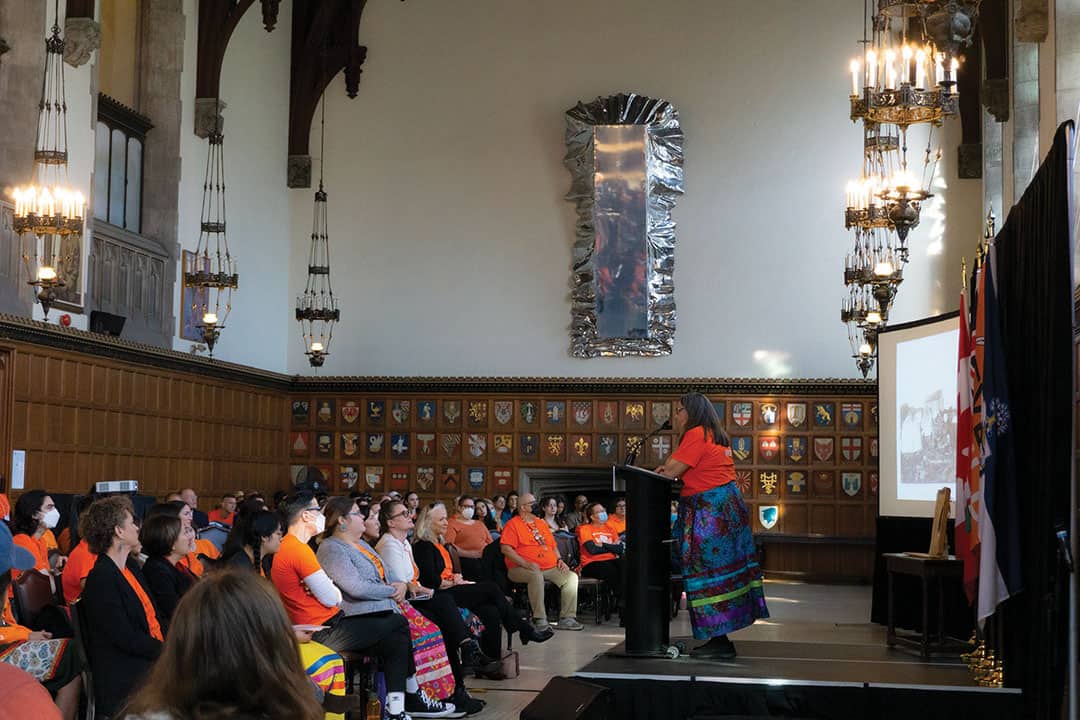Content warning: This article mentions the genocide of Indigenous peoples.
U of T commemorated September 30, the National Day for Truth and Reconciliation, by hosting events at Hart House and across U of T’s three campuses.
The Hart House event featured Brenda Wastasecoot — assistant professor at the Centre for Indigenous Studies — as the keynote speaker. A total of 170 people were in attendance in person at the Great Hall and the event was also livestreamed for virtual viewers.
Event rundown
The event began with remarks from Kelly Hannah-Moffat — vice-president, people strategy, equity & culture — who discussed the importance of Orange Shirt Day as an Indigenous-led initiative created in 2013.
The origins of Orange Shirt Day can be traced back to the experiences of residential school survivor Phyllis Webstad, who was stripped of her orange shirt and forced to change into a school uniform. Phyllis’ story symbolizes the lasting damage residential schools inflicted upon Indigenous communities.
Alexandra Gillespie — UTM’s vice-president & principal — revealed the university’s goal to “build a community worthy of trust,” as well as “earn the opportunity to learn from [and] with Indigenous peoples.”
Wastasecoot shared her personal and family experiences with the residential school system. As the youngest of 11 siblings, Wastasecoot recalled waiting with her parents for her brothers and sisters to come home from the schools.
She shared parts of her dissertation, entitled “The Nikis Story is the Story of Canada: Reflecting on the Impacts of the Indian Residential Schools.” She also recited poetry, told stories of her family, and revealed memory maps of her community.
Wastasecoot concluded her presentation by explaining that through her story and art, she aims to convey “the experience of a child left behind.”
History of Truth and Reconciliation
The National Day for Truth and Reconciliation honours the survivors of the residential school system and the children who died in the schools run by various institutions, including the Catholic church and the Canadian state. In June 2021, the Canadian government announced September 30 as the National Day for Truth and Reconciliation.
In 2017, U of T released the Final Report of U of T’s Truth and Reconciliation Steering Committee. Indigenous Elders Lee Maracle and Andrew Wesley served as advisors for the committee. The report suggested that U of T create Indigenous spaces across all three campuses, commit to supporting the hiring of Indigenous faculty and staff members, expand financial support for Elder services, and focus on Indigenous learning content in all divisions and course offerings in Aboriginal languages. Further, the report asked U of T to revisit its research policies to ensure that they were considerate of Indigenous experiences and biases against Indigenous Peoples. The report also contained recommendations for institutional leadership to receive annual reports about progress on these recommendations.
In June 2022, the John H. Daniels Faculty of Architecture, Landscape and Design announced that it would not be renewing the First Peoples Leadership Advisor to the Dean position. The faculty then replaced the First Peoples Leadership Advisor to the Dean position with the First Peoples Leadership Advisory Group. This move prompted the Graduate Architecture, Landscape, and Design Student Union and the Architecture and Visual Studies Students Union to initiate the #DanielsDoBetter2022 campaign.
At a UTM town hall in 2021, Alexandra Gillespie observed a moment of silence to acknowledge the discovery of the remains of 215 Indigenous children at the Kamloops Residential School in British Columbia. U of T President Meric Gertler, also released a statement explaining that the discovery was “absolutely heartbreaking.”
“It is part of an unconscionable history of injustice against Indigenous peoples in Canada extending from first contact to the present day,” he wrote.
In February 2022, Eve Saint, land defender and daughter of Wet’suwet’en Hereditary Chief Woos, spoke at U of T about her arrest while at a protest against the Coastal GasLink (CGL) pipeline.
In June 2022, Wet’suwet’en members sued Canada’s Royal Canadian Mounted Police and CGL pipeline company for alleged harassment and intimidation.
From July 24–29, 2022, Pope Francis travelled across Canada, stopping in Alberta, Québec, and Nunavut to offer an apology to Indigenous peoples. The Angus Reid Foundation held a poll asking people if they saw the Pope’s apology as a meaningful step toward reconciliation. Of the total respondents, 60 per cent said that it was a step toward reconciliation. However, of the respondents who self-identified as Indigenous, only 54 per cent thought that the apology meant something, while 36 per cent said that the apology did nothing for reconciliation.
If you or someone you know has been affected by the residential school system, you can call:
- Indian Residential School Crisis Line at 1-866-925-4419 (available 24 hours a day),
- Hope for Wellness Helpline at 1-855-242-3310,
- KUU-US Crisis Line at 250-723-4050,
- Talk4Healing Help Line at 1-855-554-4325.


